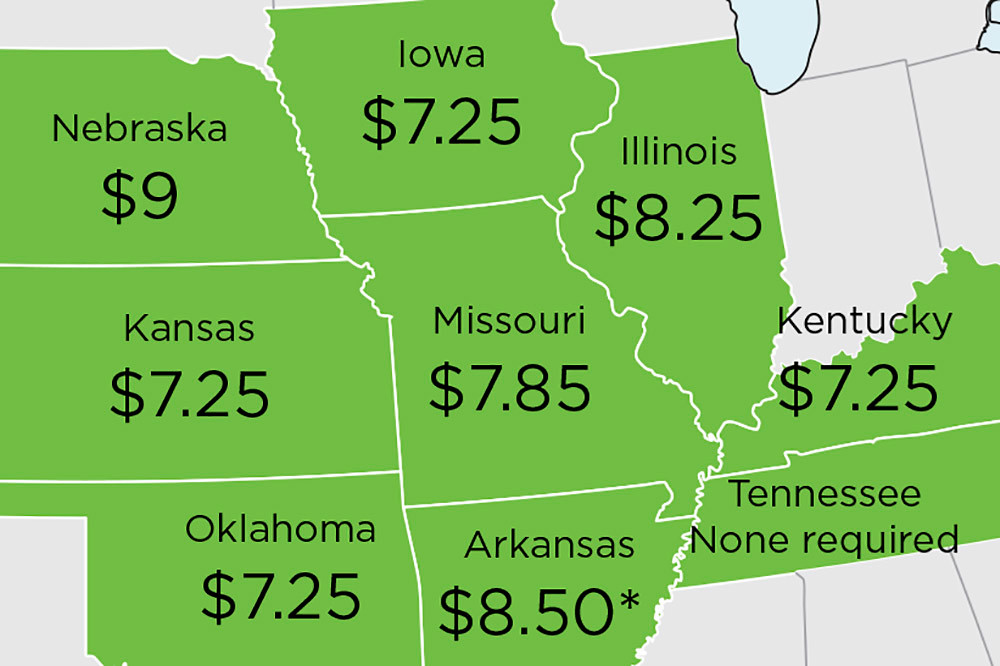YOUR BUSINESS AUTHORITY
Springfield, MO
YOUR BUSINESS AUTHORITY
Springfield, MO

The last time Missouri voters had a say on the state’s minimum wage, they opted for an increase. They’ll have another say on Nov. 6.
Proposition B, the minimum wage hike proposal, is one of several issues before voters on a crowded election ballot next month.
Missouri’s current minimum wage is $7.85 per hour, higher than the federal rate, which has remained unchanged at $7.25 an hour since January 2009.
Prop B seeks to increase the state minimum wage in increments of 85 cents per hour, beginning Jan. 1, 2019, and continuing until 2023 when it would become $12 per hour. After the increase in 2023, the wage would be adjusted annually for inflation, as it is currently.
“Proposition B is a reasonable measure, increasing gradually and going to $8.60 next year,” said Tony Wyche, spokesman for St. Louis-based Raise Up Missouri, the campaign committee supporting the issue.
Raise Up Missouri gathered more than 120,000 signatures from Missouri residents to get the proposition placed on the November ballot.
Statewide, more than 500 businesses have signed on in support with Missouri Business for a Fair Minimum Wage, a coalition of business owners. Lew Prince, treasurer for Raise Up Missouri, said as of Oct. 22 over 100 businesses in the Springfield area are among them, including Maschino’s, Bambino’s Cafe and Hoover Music Co.
However, Dan Mehan, president of the Missouri Chamber of Commerce and Industry, which represents some 44,000 businesses in the state, said he sees the measure as a job deterrent. If Prop B is approved, business owners will need to face questions of possibly cutting staff or raising prices to accommodate increasing pay for minimum wage earners in the years ahead, he said.
“The wage rates in our state should be decided by the labor market,” Mehan said, noting the state chamber has consistently come out against mandatory minimum wage hikes. “To put more rules and regulations on how businesses should operate isn’t good.”
Citing information from Washington, D.C.-based nonprofit think tank Economic Policy Institute, Wyche said if Prop B was approved, a $12 minimum wage would result in pay increases for an estimated 677,000 workers – 24 percent of the state’s workforce. He said those currently paid minimum wage that work full time in the state only earn $314 per week.
Associated Industries of Missouri, a Jefferson City-based trade group that represents around 400 businesses and manufacturers statewide, is also against the issue, said AIM President Ray McCarty. Wages already are creeping up, as employers have to pay more to get employees in the current job market that has more jobs than workers to fill them, he added.
“If they want to hold on to quality people, they’re having to pay as much as they can to keep them,” McCarty said. “But that’s market driven. It’s not artificially mandated by the government.”
The current average wage in Greene County is $19.33 per hour, according to the Missouri Department of Economic Development.
Mehan and McCarty both mentioned that cutting hours or benefits for employees could be an option that employers may consider, if necessary, which works against the same workers the measure is supposed to help.
“They may turn to automation, and that doesn’t help anybody but the companies that produce them to replace the worker,” Mehan said.
Wyche said the incremental increase proposed by the issue is a more palatable way to help employers while also allowing minimum wage workers to get pay bumps for five consecutive years.
“We feel that will help workers have more earnings in order to take care of their families and themselves, while also providing businesses with the time to plan and adjust to paying their employees more,” he said. “We felt like this was a reasonable way to do it to help both workers and businesses.”
Missouri isn’t the only state considering a minimum wage hike for this election, as Arkansas voters are being asked to consider raising the rate to $11 an hour from its current $8.50.
In Missouri, minimum wage measures also appeared on ballots in 1996 and 2006, with decidedly different results. Voters soundly defeated the 1996 issue, while the 2006 measure was approved to increase the minimum wage to $6.50 in 2007 from $5.15 per hour. That increase also made an annual adjustment based on changes in the consumer price index.
“It’s been long overdue,” Raise Up Missouri’s Wyche said. “Prices have gone up for years. Costs of basics and necessities have gone up for years, but wages haven’t kept pace.”
The issue next month also would increase penalties on Missouri businesses for paying less than minimum wage.
An employer that pays lower than minimum wage would have to pay employees the “full amount of the wage rate plus an additional amount equal to twice the unpaid wages” under Missouri statute, according to the approved ballot language.
Cedars Family Restaurant has cooked up comfort for over three decades.